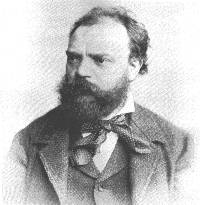Difference between revisions of "Antonin Dvorak"
From Conservapedia
(ââSome Works) |
|||
| Line 8: | Line 8: | ||
== Some Works == | == Some Works == | ||
| + | *Serenade for Strings, (1875) | ||
| + | *Scherzo capriccioso, (1883), Polonaise | ||
*Symphonies No. 1 to 8 | *Symphonies No. 1 to 8 | ||
*Symphony No. 9 in E minor, (1893), Op. 95, '''New World Symphony''', one of his most famous pieces. | *Symphony No. 9 in E minor, (1893), Op. 95, '''New World Symphony''', one of his most famous pieces. | ||
| Line 15: | Line 17: | ||
*Fourteen string quartets; (most popular: the 12th, '''The American''', Op. 96) | *Fourteen string quartets; (most popular: the 12th, '''The American''', Op. 96) | ||
*Rusalka, Op. 114, opera | *Rusalka, Op. 114, opera | ||
| + | *Slavonic Dances | ||
| + | *Slavonic Rhapsodies | ||
== See also == | == See also == | ||
Revision as of 18:01, September 30, 2008
Antonin Dvorak (Nelahozeves, Bohemia, 1841 - Praga, 1904) was a Czech composer. In 1892, he came to America and rest here until 1895.
His works display the influences of folk music, mainly Czech (furiant and dumky dance traits, polka rhythms, immediate repetition of an initial bar) but also ones that might equally be seen as American. [1]
Some Works
- Serenade for Strings, (1875)
- Scherzo capriccioso, (1883), Polonaise
- Symphonies No. 1 to 8
- Symphony No. 9 in E minor, (1893), Op. 95, New World Symphony, one of his most famous pieces.
- Five symphonic poems, (1896 - 1897)
- Concerto for Violin and Orchestra in A minor, Op. 53
- Concerto for Cello and Orchestra in B minor, Op. 104
- Fourteen string quartets; (most popular: the 12th, The American, Op. 96)
- Rusalka, Op. 114, opera
- Slavonic Dances
- Slavonic Rhapsodies
See also
- Carlos Chavez
- Pyotr Ilyich Tchaikovsky
- Maurice Ravel
- Romantic period (music)
- Classical period (music)
